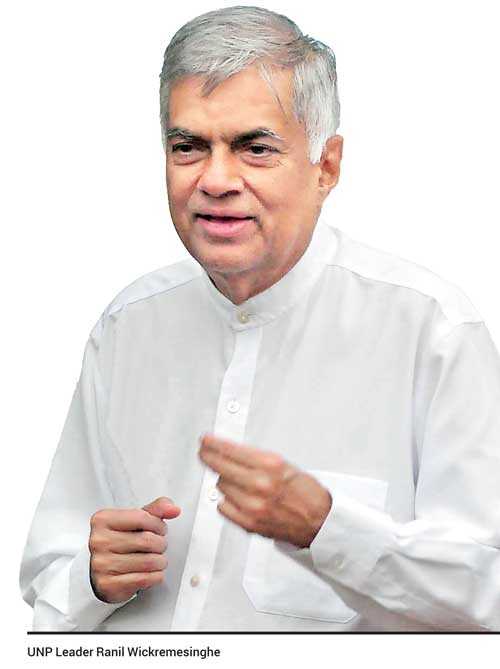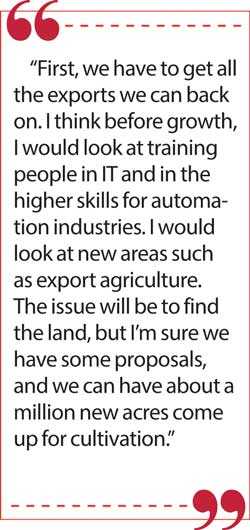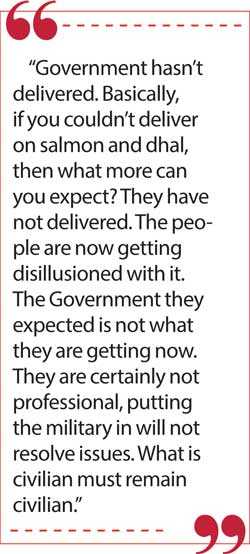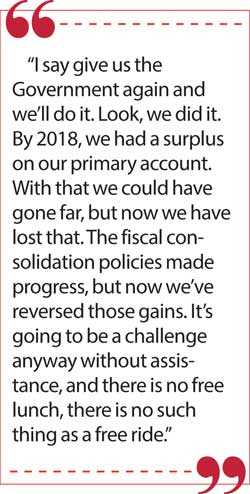Saturday Feb 21, 2026
Saturday Feb 21, 2026
Tuesday, 28 July 2020 00:39 - - {{hitsCtrl.values.hits}}
UNP leader Ranil Wickremesinghe gives his insights on Sri Lanka’s COVID-19 response, economic challenges ahead, and the party’s chances at the upcoming Parliamentary Elections
By Uditha Jayasinghe 
Q: How do you view the UNP’s campaign so far, and what kind of outcome do you expect at the election?
A: Well, the situation remains fluid, this election the coronavirus has changed everything. The issues today are not what we faced in November. I think the main question is controlling COVID-19, and then how do you face the economic issues. We are in economic difficulty, and the need is to put out a plan. But unfortunately, most political parties have not given it the serious thought that it deserves. And the people are also asking the question, why aren’t the political parties giving some plan or responding to it?
Q: What are the key points of the UNP’s approach to addressing these challenges?
A: The UNP’s approach is we have put in place a short-term plan; I think we have to give it priority for three years. We have put down what we need to do. First, to contain the coronavirus, and secondly, to build up the economy and deal with the issues that are related to the economy.
Q: And in your view, what are the key issues of the economy that needs to be addressed?
A: I think, basically, we have lost about $ 7 billion worth of exports, and we are in a serious crisis. Our balance of payments is really precarious. How do we get the money? Without that we can’t survive. Just slashing all the imports is not a solution. You’ve got to tackle the economic problem. And then, the measures the Government took in November have reduced our revenue. I think in the first quarter we lost a fair amount, according to the reports. Unless we address these two issues, I don’t think we can address the other problems. 
Our solution is to raise $ 6 billion. The Government is faced with revenue issues because they moved away from the agreed program, and they have created a larger deficit. Now this raises questions of their commitment, and the results of their changed policies. I can understand a Government wanting to change some of the measures that were taken, but then you have to discuss and come to an arrangement with the International Monetary Fund (IMF) and others.
It has even come to a position where Japan has said our financial policies are not correct, and they have stopped some of the money. Now there is a big question mark over some projects. The IMF, which has now been appointed to give relief on COVID-19-related economic issues, has given relief to all the countries around us. Pakistan had in fact wanted $ 5 billion, and they’ve already got the first instalment, they are now discussing about how to get the rest of it. Bangladesh has asked for $ 3 billion, but we unfortunately have been unable to do the same. We have to get a mix of what we can get from the IMF, plus long-term loans, and different projects from bilateral and multilateral partners. But we haven’t got any of those.
We are in serious difficulties. A multitude of issues will come up now. The Government doesn’t know what they want to do. They are talking about getting a Repo of about $ 1 billion from the US Federal Reserve, which clearly shows the Government is short of funds. So it looks very confusing to everyone. This is the main issue. If you get that (Repo), of course you can raise the money you need. In the market, I think you can issue long-term securities, I think you can call it certificates or bonds for 25 years to 50 years, and they have to be accepted as bankable documents. With this mix of cash and securities, you can manage to sort of navigate your way through debt repayments and maintaining reserves.
Another issue is, what will happen if the virus is around next year? I think that’s an issue that will be taken up globally. What we’ve agreed to now, is to get into a higher rate of debt, as long as we can repay it. But we still have to restructure our economy to show that we will be in a position to repay it. As to what will happen next year if this continues, I think the world in general will have to meet and discuss how to deal with it. But we have to just look at managing 2020 and the first part of 2021 first, and make medium-term plans later.
Q: You spoke of IMF funding but one of the challenges is such funds come with a lot of reforms and changes, including economic restructuring, which even under your administration was quite challenging. Do you think Sri Lanka is up for another round of that?
A: You can do it. We did it. I say give us the Government again and we’ll do it. Look, we did it. By 2018, we had a surplus on our primary account. With that we could have gone far, but now we have lost that. The fiscal consolidation policies made progress, but now we’ve reversed those gains. It’s going to be a challenge anyway without assistance, and there is no free lunch, there is no such thing as a free ride.
Q: There was a lot of talk in 2015 about restructuring State Owned Enterprises (SOEs), about bringing Sri Lanka up in the World Bank’s Ease of Doing Business rankings, and many other measures. But there was only modest success. What do you think went wrong?
A: I think we focused on the whole issue of fiscal consolidation, and the performance of State Owned Enterprises did improve. But the question is, how far can you can go with this present structure? You need a more commercial operational structures for State enterprises. In the Ease of Doing Business, we certainly made some progress, but now we have to come on to the area of legislation which will enable workers, companies and entrepreneurs. That’s why we have proposed what we call the Development Act, which we had already discussed. Through this, we can cut through a lot of the time-consuming approval processes. Some are necessary, for instance, I think environment-related approvals need more time. But there are many other approvals we can give in a timely manner. The preliminary approval can be subject to environmental approval, but for some projects we may not need those.
This is why the best way out is to go for industrial estates, with the buildings and all other facilities located to ensure that any industrial discharge can be environmentally handled. Other aspects such as access to reasonably-priced power need to be resolved as well, for Sri Lanka to move up these rankings. So, the basic issues have to be sorted out.
Q: One of Sri Lanka’s perennial challenges has been FDI. Not only during your administration, but also after the war, there wasn’t a significant increase in FDI. Do you think that situation can change?
A: After the war, we had a good opportunity but we lost it. After 2015 people were getting in, people were looking at our fiscal consolidation efforts and reforms, and were considering investment. When we were picking up, unfortunately we were hit by the Easter Sunday attacks, and now we have a global issue to deal with. Well, I think we have to be ready for a tough scenario. But I am confident that with reforms and restructuring we can face it. The issue is how fast will the West and other key developing countries recover from the present crisis, and engage in driving global investment again? It all depends on how their markets are next year, and the year after. 
But at some stage, they will look for other locations, because there is a general consensus, even leaving aside political issues, that a country’s manufacturing capacity should be spread out. People are saying it’s not wise to invest only in one country or region. They say don’t keep all your eggs in one basket when it comes to manufacturing, because your manufacturing can be affected by any issue. It can be like what happened to Japan when the tsunami happened. So, you have to spread it out in to different regions, and the Indian Ocean is a suitable area. In any case, China was starting to relocate their industries, which is why we were talking to them about bringing them to Hambantota. So, that shift will have to take place, it depends on automation and semi-automation. So, part of manufacturing will go back to their countries, and the others will be out here.
Q: The Government has called for a debt moratorium from India, but that will have little impact as our biggest debt is not to India, it is to international financial markets. So what are your views on how Sri Lanka can better manage debt?
A: Yes, I know. Basically, not only India, even if the G20 moratorium comes through, that will not assist us much. Some of the debt we have received was really at concessional rates, like from the Japanese. The core issue is what is happening with private debt. We have to look at what is happening with the Paris Club and the London Club, and those are the hard issues we have to negotiate. Without a fiscal consolidation program, there is no means by which we can negotiate. There again it is also unlikely that they’ll allow too much delay. You have to go in with a good convincing case.
Q: If you are given the opportunity to form another Government, what will your approach to be to debt management?
A: Mine would be to first get the $ 6 billion. With that, we will have enough time and resources to give a message to the people and the world that we are moving forward. You have to take the first few steps. If your debt becomes too serious, if a second wave of COVID-19 comes, and there is more economic damage, you have to still find solutions. When the confidence comes back, you can deal with the private debt.
Q: Sri Lanka’s growth is expected to be low this year, by some estimates 1.5% or lower. How do you see this situation, and what measures would you propose to reverse it?
A: This year, it will be minus growth. We have to expect it. It’s a question of whether there will be growth next year. You see what happened is that after the war, our growth was artificial. Instead of getting investments and allowing growth to take place driven by the private sector, after about 2013, we just put all the money into non-tradable goods such as roads and other infrastructure projects. One of the reasons for holding the Presidential Elections early was to try to win it before the crisis hit.
Q: What would be the sectors you would focus on to promote growth?
A: First, we have to get all the exports we can back on. I think before growth I would look at training people in IT and in the higher skills for automation industries. That is what I would really work on. I would look at new areas such as export agriculture. The Government talks of becoming self-sufficient in food: we are already self-sufficient, it’s just that we can’t market what we have. I think what we can do for agriculture is to improve the supply chains, to get the cold storage and transport links done, that is an area that we can get done immediately. Plus start introducing technology into agriculture, and look at the new crops. The issue will be to find the land, but I’m sure we have some proposals and we can have about a million new acres come up for cultivation.
Q: Sri Lanka has long struggled to be connected to global value chains. How can we bridge this gap?
A: We’ve got to start on it. We were on it, but our scale of production was not enough, because our main focus had been on apparels and tourism. We need a bigger push, which means backing our entrepreneurs. We were just starting that when the Easter Sunday attacks hit us.
Q: Another key challenge for Sri Lanka is remittances, which have been badly hit by COVID-19 and how to support migrant workers better. What are your views?
A: All countries dependent on foreign remittances are being hit. The predictions are that it will never return to the levels it was at earlier. Secondly, even if people are willing to go abroad, those countries will be cautious of who they will select. So, that’s why we will have to rethink our economy completely. It’s like you’re in the middle of what is called the “fog of war”: you don’t know what is out there, you have to keep moving and hope you can make it. Global trade has to keep moving, and there are new areas that are developing, as well as regions. We have to get into a regional comprehensive economic partnership within South Asia. I think South Asia and BIMSTEC are important for us. There may be resistance to the agreements, so we should look at what is needed. The Regional Comprehensive Economic Partnership (RCEP) of East Asia, for example, is important. We also have to look at trade adjustment programs, because there are areas where we will need help. We have to plan now, we can’t get into RCEP immediately. Once you’re working at it, your credibility increases and opportunities will emerge.
Q: The Government is relying heavily on the Central Bank for COVID-19 economic support, and there have been concerns raised about political interference. What is your view?
A: Banks must be able to give out money, but then its depositors’ money they give out. If you want them to be more liberal you have to put more safeguards in. As for the Central Bank, the national policy is laid down by the Government, whether right or wrong. The Monitory Board must act within it. But you don’t go to micro-manage everything at the Central Bank. You cannot treat the Central Bank as totally independent, nor can you treat it like another cooperative.
Q: Would you say that the break-up of the UNP and its internal divisions will affect your chances at the election?
A: We are coming as the UNP. People have left us from the time of Mr. Bandaranaike, and recently Court ruled that this is a separate party. So it’s a question of how much can they take from us. Our appeal is to the electorate, including those who voted for Gotabaya Rajapaksa, and to get them back. There is a lot of frustration. We believe our vote base reduction will be a minimal amount. The SJB has to come out with where exactly they stand, because there are already clearly defined vote bases for the SLPP and the JVP, and the SJB has to decide where they position themselves from a policy perspective.
Q: There are a lot of parliamentarians and former senior UNP members in the SJB, are you concerned that it gives them an edge?
A: No, I look at it this way. We got people through (into Parliament) in 2015. But when you look at the Presidential Elections, we’ve done very badly, except in the city of Colombo. We have to now focus and run on the program of attracting young people, new faces to the party. So, this is the issue. Even after the Presidential Election, I said we may have to do some reshuffling, drop some people, and get some new faces. But there was resistance to it. But we have to start anew. There is no other option, you can’t be sticking to what you have. We could benefit once our candidates start running.
Q: Are you concerned about losing minority votes to SJB?
A: Yes, because we are talking about a Sri Lankan identity, and some of the Tamils and Muslims are concerned about identifying themselves with parties that do identity politics, and they think the UNP is safer because we are made up of members of all communities. We are building that up. The second option we had, which some smaller parties didn’t agree to, is that we should be the major partner and they should come in as minor partners, as we did in 2015, but some of them wanted to hold their old position at the same time. They were not committing themselves to a common Sri Lankan identity. So, these were the issues we had.
Q: Given the stance some political parties have taken in championing nationalism, do you think the ‘‘common Sri Lankan identity” is still a valid proposition?
A: It is, I think so. The pendulum swung one way, but it can come the other way. Our campaign has also taken note of the rising sentiments, and is trying to respond to them. I don’t think we paid sufficient attention. But there are a lot of people, and we have spoken to many in the Sangha as well, who thought there should be more minority inclusion. We need it, but what we don’t want is identity politics. But if you’re having two parties with a mix of communities, that’s a good idea.
Q: Do you think remaining the UNP leader has been beneficial to the SLPP?
A: One reason we lost was obviously that the President was not working with us. People were worried about what type of Government could come in, because of the Easter Sunday attacks. We should have had a working relationship (with the former President). The issue is that the way we lost is not something we anticipated. It was about two million votes lost. It’s a serious issue. And with this, the minorities are concerned when the Sinhalese are not there. So, we have to go back and work on these votes, which I have done at this election.
Q: You touched on the issues of the Yahapalana Government. Would you say as the Prime Minister of that administration, you also had a part to play in the deterioration of relations with the former President?
A: My view was that everyone had their shortcomings. But the fact was that we had decided on a Government where the Cabinet would be supreme, and the President at some stage didn’t want to accept that. You can see that he has changed his stance completely, and gone over to the other side completely. So, that’s some of the issues we had.
Q: There was also criticism that you formed the CCEM and that took some power away from the Cabinet? What is your take on that?
A: No, CCEM was the Cabinet Committee on Economic Management, and it reported back to Cabinet. Any Minister who was concerned could come sit in on meetings. Many larger countries have Cabinet committees on security, and on foreign relations. It is part of the mechanism of government, Cabinet is government by committee, such that Cabinet is the main committee and there are sub-committees, beyond that are the specialist committees.
Q: If you had the chance for a do-over, what would you do differently?
A: I would stick to one agenda. I have a lot of experience working with the SLFP, but there were some instances where differences were too large, or the outlook was too big to be bridged. The style of running Ministries was also different. Some of the non-UNP administration Ministers ran it the way they wanted. We tried to get some uniformity to it nonetheless.
Q: You have been a critic of the Rajapaksa administration for a long time, but there has also been criticism that you didn’t push hard enough on corruption-related investigation and accountability.
A: No, I mean at the end of the day, you have to ensure that the decision to prosecute should be taken independently by the Attorney General. I stood for that. I didn’t push. I said, look at the evidence, let the Police get evidence, and let the AG decide and be 200% sure of it. We insisted on certain principles to be followed.
Q: What do you think of the President’s efforts so far, and are you concerned about the inclusion of military personnel in Government?
A: Firstly, they haven’t delivered. Basically, if you couldn’t deliver on salmon and dhal, then what more can you expect? They have not delivered. The people are now getting disillusioned with it. The Government they expected is not what they are getting now. They are certainly not professional. Putting the military in will not resolve issues. What is civilian must remain civilian.
Q: Any final message you would like send to the public?
A: We are facing the biggest crisis since World War II and Independence, and the Government is ducking. If we don’t act now, the future will be gone for the younger generation. Only the UNP has a plan: good or bad, we can discuss it. That’s what I want to tell the public. If someone else has a plan, put it out, and let’s discuss it.